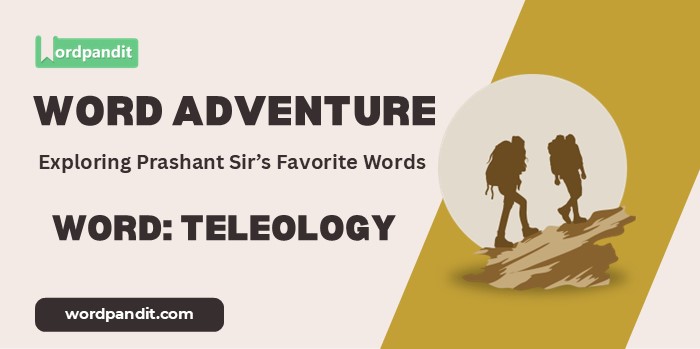Word Adventure: Teleology
The Headline
"Teleology: Understanding the Purpose Behind Everything"
The Scoop
In the grand tapestry of philosophical concepts, some words open doors to entirely new ways of thinking about the world. 'Teleology' is one such term – a powerful lens through which we can examine the purpose, design, and ultimate aims of everything from natural phenomena to human actions. Let's explore this profound concept that has influenced fields ranging from ancient philosophy to modern biology.
Let's Break It Down
The Plot Thickens
The concept of teleology has a rich history dating back to ancient Greece, where philosophers like Aristotle used it to understand the natural world. Aristotle believed that everything in nature has a final cause or purpose – its 'telos'. For instance, he would say that rain falls to help plants grow, rather than simply describing the meteorological processes involved.
During the Scientific Revolution, teleological thinking faced challenges as mechanical explanations gained prominence. However, it has persisted in various forms, from discussions of evolutionary adaptation to debates about consciousness and free will. Even in modern times, teleological thinking influences fields like design theory, where understanding purpose is crucial.
The debate between teleological and mechanistic explanations continues to shape our understanding of phenomena ranging from biological evolution to artificial intelligence.
Word in the Wild
The Twist
Here's an intriguing aspect of teleology: while modern science often rejects teleological explanations as unscientific, we humans seem hardwired for teleological thinking. Studies show that even young children naturally seek purpose-based explanations for things they observe. This tendency might be so deeply ingrained that it's actually beneficial for our cognitive development and problem-solving abilities. Perhaps the real question isn't whether teleological thinking is right or wrong, but rather when and how it's most useful!
Make It Stick
Teleology: When "how it happens" takes a backseat to "why it happens"!
Your Turn
Think about something in your daily life – it could be a tool, a natural phenomenon, or a social convention. What's its apparent purpose or 'telos'? Now try to explain it both teleologically (focusing on its purpose) and mechanistically (focusing on how it works). Share your insights in the comments below. Let's explore how these different perspectives might enhance our understanding!
Down the Rabbit Hole
- Curious about teleology in different fields? Explore its role in biology, ethics, or artificial intelligence design.
- Interested in philosophical perspectives? Dive into Aristotle's final causes, Kant's purposiveness, or modern design theory.
- Want to explore related concepts? Look into determinism, functionalism, or the anthropic principle.
The Last Word
As we conclude our exploration of 'teleology', I hope you've gained appreciation for this profound way of thinking about purpose and design in our world. Whether you're examining natural phenomena, human creations, or your own actions, considering their teleology can provide valuable insights. The next time you find yourself asking "why" something exists or happens, remember – you're engaging in teleological thinking! Until our next word adventure, this is Prashant from Wordpandit, encouraging you to keep exploring the purposes that shape our world!












